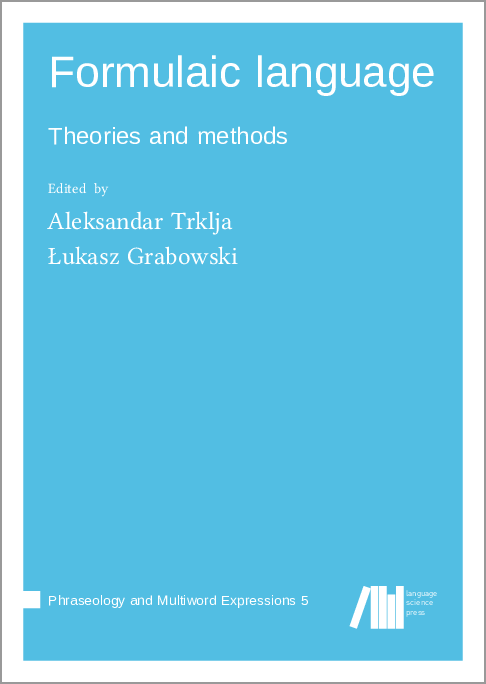We log anonymous usage statistics. Please read the privacy information for details.
Formulaic language: Theories and methods
Synopsis
The notion of formulaicity has received increasing attention in disciplines and areas as diverse as linguistics, literary studies, art theory and art history. In recent years, linguistic studies of formulaicity have been flourishing and the very notion of formulaicity has been approached from various methodological and theoretical perspectives and with various purposes in mind. The linguistic approach to formulaicity is still in a state of rapid development and the objective of the current volume is to present the current explorations in the field. Papers collected in the volume make numerous suggestions for further development of the field and they are arranged into three complementary parts. The first part, with three chapters, presents new theoretical and methodological insights as well as their practical application in the development of custom-designed software tools for identification and exploration of formulaic language in texts. Two papers in the second part explore formulaic language in the context of language learning. Finally, the third part, with three chapters, showcases descriptive research on formulaic language conducted primarily from the perspectives of corpus linguistics and translation studies. The volume will be of interest to anyone involved in the study of formulaic language either from a theoretical or a practical perspective.
Chapters
-
Introduction
-
Predictability and prefab statusThe case of adjective + noun sequences in English
-
Cascading collocationsCollocades as correlates of formulaic language
-
Exploring the valency of collocational chains
-
Paths to formulaicityHow do L2 speakers internalise new formulaic material?
-
Formulaic sequences with ideational meanings in L1 novice and expert academic writing
-
Reading discourses through their phraseologyThe case of Brexit
-
Grammar patterns as an exploratory tool for studying formulaicity in English-to-Polish translationA corpus-based study
-
God, Devil and ChristA corpus-based study of Russian formulaic idioms and their English and Finnish translation equivalents
Reviews
-
Review in Cadernos De Fraseoloxía Galega 25
by Sandra Ruiz-Morilla
published February 27, 2025
[...]A obra que estamos a recensionar destaca polo seu enfoque multidisciplinar e ofrece unha visión actual e polifacética acerca das liñas de investigación máis novidosas no eido. Constátase a súa utilidade para acceder ao estado da cuestión respecto da linguaxe formulaica, así como para coñecer as tendencias na investigación e os seus métodos. Preséntase un soporte lóxico de creación propia baixo licenza Creative Commons que pode resultar proveitoso para a comunidade científica. As investigacións conteñen elementos innovadores e os diferentes enfoques contribúen a configurar unha lectura enriquecedora. [...]




